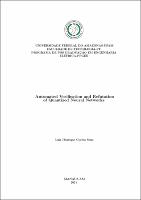| ???jsp.display-item.social.title??? |


|
Please use this identifier to cite or link to this item:
https://tede.ufam.edu.br/handle/tede/8845Full metadata record
| DC Field | Value | Language |
|---|---|---|
| dc.creator | Sena, Luiz Henrique Coelho | - |
| dc.creator.Lattes | http://lattes.cnpq.br/1493664223350422 | eng |
| dc.contributor.advisor1 | Cordeiro, Lucas Carvalho | - |
| dc.contributor.advisor1Lattes | http://lattes.cnpq.br/5005832876603012 | eng |
| dc.contributor.referee1 | Lima Filho, Eddie Batista de | - |
| dc.contributor.referee2 | Santos, Eulanda Miranda dos | - |
| dc.date.issued | 2022-03-04 | - |
| dc.identifier.citation | SENA, Luiz Henrique Coelho. Automated Verification and Refutation of Quantized Neural Networks. 2022. 55 f. Dissertação (Mestrado em Engenharia Elétrica) - Universidade Federal do Amazonas, Manaus (AM), 2022. | eng |
| dc.identifier.uri | https://tede.ufam.edu.br/handle/tede/8845 | - |
| dc.description.resumo | Artificial Neural Networks (ANNs) are being deployed for an increasing number of safety- critical applications, including autonomous cars and medical diagnosis. However, con- cerns about their reliability have been raised due to their black-box nature and apparent fragility to adversarial attacks. These concerns are amplified when ANNs are deployed on restricted system, which limit the precision of mathematical operations and thus in- troduce additional quantization errors. Here, we develop and evaluate a novel symbolic verification framework using software model checking (SMC) and satisfiability modulo theories (SMT) to check for vulnerabilities in ANNs and mainly in Multilayer Perceptron (MLP). More specifically, here is proposed several ANN-related optimizations for SMC, including invariant inference via interval analysis, slicing, expression simplifications, and discretization of non-linear activation functions. With this verification framework, we can provide formal guarantees on the safe behavior of ANNs implemented both in floating- and fixed-point arithmetic. In this regard, the current verification approach was able to verify and produce adversarial examples for 52 test cases spanning image classifica- tion and general machine learning applications. Furthermore, for small- to medium-sized ANN, this approach completes most of its verification runs in minutes. Moreover, in con- trast to most state-of-the-art methods, the presented approach is not restricted to specific choices regarding activation functions and non-quantized representations. Experiments show that this approach can analyze larger ANN implementations and substantially re- duce the verification time compared to state-of-the-art techniques that use SMT solving. | eng |
| dc.description.abstract | Artificial Neural Networks (ANNs) are being deployed for an increasing number of safety- critical applications, including autonomous cars and medical diagnosis. However, con- cerns about their reliability have been raised due to their black-box nature and apparent fragility to adversarial attacks. These concerns are amplified when ANNs are deployed on restricted system, which limit the precision of mathematical operations and thus in- troduce additional quantization errors. Here, we develop and evaluate a novel symbolic verification framework using software model checking (SMC) and satisfiability modulo theories (SMT) to check for vulnerabilities in ANNs and mainly in Multilayer Perceptron (MLP). More specifically, here is proposed several ANN-related optimizations for SMC, including invariant inference via interval analysis, slicing, expression simplifications, and discretization of non-linear activation functions. With this verification framework, we can provide formal guarantees on the safe behavior of ANNs implemented both in floating- and fixed-point arithmetic. In this regard, the current verification approach was able to verify and produce adversarial examples for 52 test cases spanning image classifica- tion and general machine learning applications. Furthermore, for small- to medium-sized ANN, this approach completes most of its verification runs in minutes. Moreover, in con- trast to most state-of-the-art methods, the presented approach is not restricted to specific choices regarding activation functions and non-quantized representations. Experiments show that this approach can analyze larger ANN implementations and substantially re- duce the verification time compared to state-of-the-art techniques that use SMT solving | eng |
| dc.format | application/pdf | * |
| dc.thumbnail.url | https://tede.ufam.edu.br/retrieve/55649/Disserta%c3%a7%c3%a3o_LuizSena_PPGEE.pdf.jpg | * |
| dc.language | eng | eng |
| dc.publisher | Universidade Federal do Amazonas | eng |
| dc.publisher.department | Faculdade de Tecnologia | eng |
| dc.publisher.country | Brasil | eng |
| dc.publisher.initials | UFAM | eng |
| dc.publisher.program | Programa de Pós-graduação em Engenharia Elétrica | eng |
| dc.rights | Acesso Aberto | - |
| dc.subject.cnpq | CIENCIAS EXATAS E DA TERRA | eng |
| dc.title | Automated verification and refutation of quantized neural networks | eng |
| dc.type | Dissertação | eng |
| dc.subject.user | Model Checking | por |
| dc.subject.user | Neural Networks | por |
| dc.subject.user | Quantized Neural Networks | por |
| Appears in Collections: | Mestrado em Engenharia Elétrica | |
Files in This Item:
| File | Description | Size | Format | |
|---|---|---|---|---|
| Dissertação_LuizSena_PPGEE.pdf | 1.33 MB | Adobe PDF |  Download/Open Preview |
Items in DSpace are protected by copyright, with all rights reserved, unless otherwise indicated.




